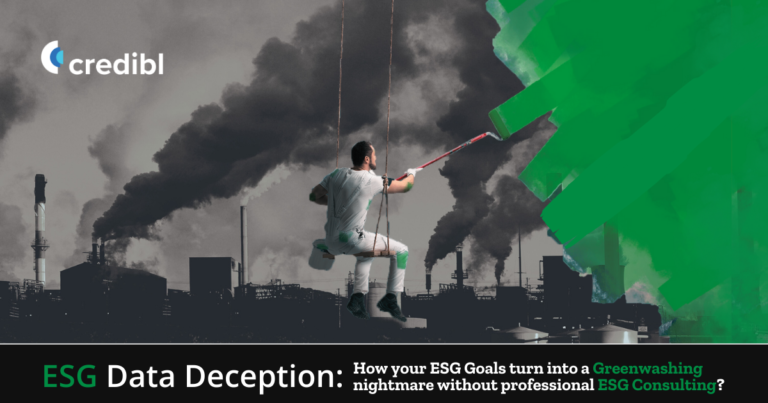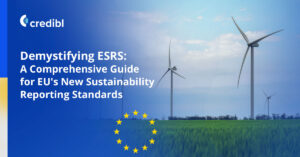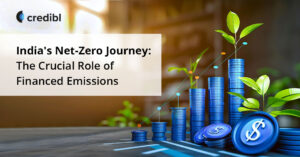Introduction: The Sustainability Imperative and the Data Disconnect
The urgency for corporations to embrace sustainable practices is undeniable. From climate change and resource depletion to social inequities and governance failures, the consequences of inaction loom large. Investors, consumers, and regulators increasingly demand transparent and impactful ESG (environmental, social, and governance) performance. Setting ambitious sustainability goals has become commonplace, but the chasm between ambition and action often remains wide.
A 2023 study by McKinsey & Company found that while 83% of companies have set sustainability goals, only 27% are confident they will achieve them. This disconnect stems from several challenges:
- Data fragmentation and lack of visibility: Companies often struggle to collect, analyze, and interpret data across their entire value chain, hindering a holistic understanding of their ESG impact.
- Resource constraints: Implementing sustainable practices requires investments in technology, expertise, and infrastructure, which can be challenging for many companies, especially SMEs.
- Lack of strategic alignment: Goals aren’t always effectively translated into actionable plans with clear metrics and accountability.
- Greenwashing concerns: The fear of being perceived as “greenwashing” can lead to companies opting for superficial initiatives instead of substantive change.
These challenges underscore the need for a bridge between aspirations and tangible results. Enter real-time data-driven ESG consulting, a powerful approach that empowers companies to navigate this complex landscape.
The Evolving Landscape of Corporate Sustainability: Challenges and Opportunities
The ESG landscape is undergoing rapid evolution, driven by several key trends:
- Heightened regulatory pressures: Governments worldwide are enacting stricter regulations on environmental emissions, resource use, and social responsibility. For example, the European Union’s Corporate Sustainability Reporting Directive (CSRD) mandates comprehensive ESG reporting for large companies starting in 2024.
- Shifting investor expectations: Sustainable investments are experiencing unprecedented growth, with investors increasingly prioritizing companies that demonstrate clear ESG commitments. A 2022 Morgan Stanley report found that sustainable funds attracted a record $649 billion in net inflows globally.
- Consumer demand for transparency and action: Consumers are demanding transparency and accountability from companies on their environmental and social impact. A 2023 study by Accenture found that 83% of consumers are willing to pay more for sustainable products and services.
- Technological advancements: Innovations in data analytics, artificial intelligence, and blockchain are unlocking new possibilities for monitoring, measuring, and improving ESG performance.
However, alongside these opportunities lie significant challenges:
- Greenwashing remains a concern: Some companies are still resorting to misleading claims and superficial initiatives to enhance their ESG image. A 2022 study by TerraChoice found that 93% of sustainability claims made in online advertisements were misleading or unsubstantiated.
- Data privacy and security concerns: As companies collect more data for ESG purposes, ensuring privacy and security becomes paramount. A 2023 survey by PwC found that 86% of executives are concerned about data privacy risks associated with ESG reporting.
- Lack of standardized metrics and frameworks: The absence of universally accepted ESG metrics and frameworks can hinder comparability and create confusion for stakeholders.
Despite these challenges, the growing momentum behind ESG creates a significant opportunity for companies that embrace transparency, data-driven insights, and real action.
Real-Time Data: Fueling Sustainable Transformation
Real-time data is the fuel that powers effective ESG strategies. By continuously monitoring and analyzing data across their entire value chain, companies can gain actionable insights into their environmental footprint, social impact, and governance practices. This data can be used to:
- Identify areas for improvement: Analyze energy consumption, waste generation, greenhouse gas emissions, diversity and inclusion metrics, and ethical sourcing practices to pinpoint areas needing attention.
- Track progress towards goals: Set clear targets and use real-time data to monitor progress, ensuring accountability and driving continuous improvement.
- Inform strategic decision-making: Leverage data-driven insights to inform investments, resource allocation, and operational changes that support sustainable practices.
- Improve risk management: Proactively identify potential environmental, social, and governance risks and implement measures to mitigate them.
- Enhance transparency and communication: Utilize data to create robust and credible ESG reports that demonstrate commitment to stakeholders.
Examples of Real-Time Data in Action:
- Unilever: The consumer goods giant uses real-time data from sensors to monitor energy consumption in their factories, resulting in a 17% reduction in energy use since 2010.
- Nestlé: The food and beverage company tracks water usage across its supply chain in real time, helping it reduce water withdrawal by 40% since 2010.
The Power of ESG Consulting:
Bridging the gap between data and action is where the true power of ESG consulting lies. Skilled consultants act as strategic partners, bringing expertise, experience, and a data-driven approach to help companies translate aspirations into tangible outcomes.
Strategy Development:
- Aligning Goals with Data: Consultants analyze real-time data to identify strengths, weaknesses, and opportunities, helping companies set realistic and measurable ESG goals aligned with their overall business strategy.
- Roadmap for Change: They collaborate with stakeholders to develop a comprehensive roadmap for change, outlining key initiatives, timelines, and resource allocation.
- Industry Benchmarking: By benchmarking against industry leaders and best practices, consultants ensure goals are ambitious yet achievable.
Implementation:
- Technical Expertise: Consultants provide the technical know-how to implement complex sustainability solutions, from renewable energy systems to waste reduction technologies.
- Data Analysis & Insights: They leverage advanced data analytics tools to extract actionable insights, enabling data-driven decision-making.
- Project Management: Consultants manage project execution, ensuring milestones are met, budgets are adhered to, and risks are mitigated.
Reporting & Communication:
- Transparency & Credibility: Consultants assist with developing transparent and comprehensive ESG reports aligned with relevant standards (e.g., GRI, SASB).
- Stakeholder Engagement: They help companies effectively communicate their ESG performance to investors, customers, and other stakeholders, building trust and credibility.
Looking Ahead: The Future of ESG and Data:
The future of ESG is brimming with innovation, driven by:
- AI-powered Solutions: AI algorithms can analyze vast datasets to identify hidden patterns, predict environmental risks, and optimize resource management. For example, IBM’s Maximo Asset Management solution uses AI to predict equipment failures and optimize maintenance, reducing waste and emissions.
- Blockchain for Transparency: Blockchain technology can create secure and transparent supply chains, ensuring ethical sourcing and reducing the risk of greenwashing. For instance, Everledger uses blockchain to track the origin of diamonds, combating conflict diamonds and promoting ethical sourcing.
- Big Data & Analytics: The increasing volume and sophistication of data analytics tools will enable even deeper insights into ESG performance, driving more targeted and impactful actions.
- Continuous Innovation & Adaptation: Evolving regulations, stakeholder expectations, and technological advancements necessitate continuous innovation and adaptation. Companies that embrace these trends will be better positioned to navigate the changing landscape and achieve their sustainability goals.
- Positive Outlook: The future of ESG is bright. Data-driven insights and innovative solutions hold immense potential to create a more sustainable future. By embracing real-time data and partnering with skilled ESG consultants, companies can translate their aspirations into action, contributing to a healthier planet and a more just society.
Conclusion
The journey towards corporate sustainability is paved with data and action. Real-time data provides insights, while ESG consulting bridges the gap, transforming aspirations into impactful outcomes. By leveraging expert guidance, data-driven strategies, and cutting-edge solutions, companies can achieve their sustainability goals, enhance their reputation, and contribute to a better future. Consider partnering with a qualified ESG consultant to embark on your sustainability journey.







